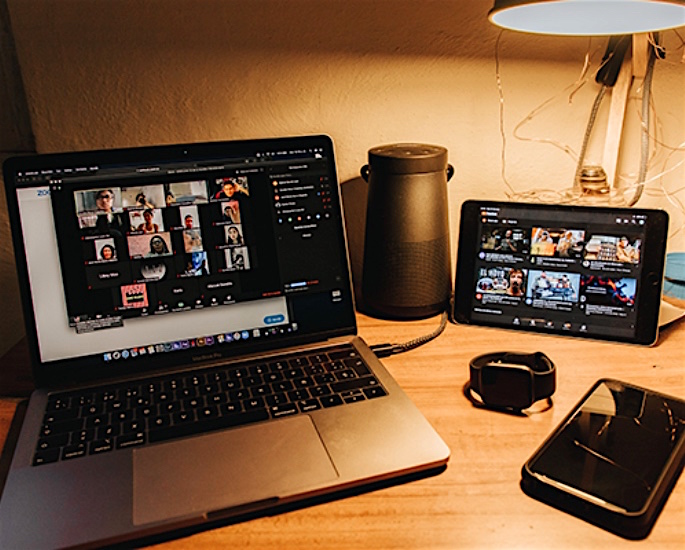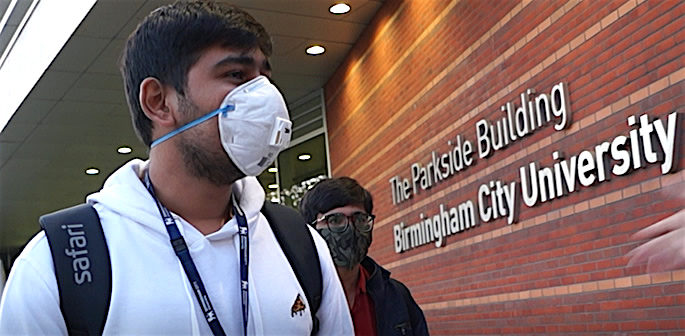“We are not getting taught properly"
UK freshers have been anticipating their move to university for months. Countless hours were spent studying for exams, shopping for their new rooms and packing first-year essentials.
However, the tumultuous impact that Covid-19 would have during their first few months at university was unpredictable.
A primary concern for UK freshers, parents and university staff was how to keep everyone safe and maintain government regulations whilst students flocked to different parts of the country for the first time.
Despite being warned that it was far too soon for a mass return to campus life, many universities have continued with their schedule as normal. Students have been living on campus for over a month now.
A key change during this month has been the moving of lectures and seminars online where possible.
Many freshers’ events have been cancelled in favour of zoom social sessions. Students must self-isolate if any of their flatmates have been diagnosed with coronavirus – or come into close contact with anyone who has.
Despite these measures, students have been adding to the soaring toll in the country.
Northumbria University said 770 students had tested positive. 78 of these has symptoms of the virus.
University of Nottingham states that 425 of its students had been diagnosed with active cases. This includes 226 students in private accommodation and 106 others living in halls.
Meanwhile, government figures showed the virus reproduction number is up from 1.3 to 1.6. This indicates an increasing rate of transmission.
With thousands of UK freshers embarking on university for the first time, it is inevitable that this was not how they envisioned living away from home for the first time.
DESIblitz has exclusively interviewed six freshers from across the country to discuss their experience about their journey so far.
Expectations Versus Reality

There is often a high expectation of what university will be like for prospective students. Many Asian students are the first in their families to attend university therefore the excitement and pressure of securing a place is vast.
Much of the excitement of the adventures that university life will bring often lives up to the expectation. Many graduates have been quick to label their years as undergraduates as the “best three years of my life.”
However, this year has been dramatically different.
The nervousness of living away from home for the first time has not been met with lively social events for students to meet one another.
The thrill of studying a subject you have specifically chosen has not begun in large lecture theatres as seen in movies.
The happy voices of housemates have been quietened by social distancing measures.
Kieshan, an 18-year-old fresher, has begun studying Health Sciences at the University of Nottingham and is currently living in halls on campus. He thought that:
“…it [university] would be a lot more fun and social, but it’s not been possible.”
Likewise, Shanice, a 19-year-old student studying English with Creative Writing at the University of Leicester, says that her experience has been completely different from what she expected. She says:
“I was excited to join societies and meet people with similar interests to mine. It’s not been the case, so I feel like everything I’ve worked hard for until now has fallen a little flat.”
This sense of disappointment and the deflated tone was also felt by Shanel, a 19-year-old fresher studying Business Management at Coventry University.
Shanel initially expected university life to be highly social and full of fun activities to get involved with. She says:
“Due to Covid-19, it’s not possible to attend proper fresher events or socialise like how we normally would.”
It is therefore clear to see the disillusionment that freshers have experienced this academic year.
On the other hand, some students’ expectations did not fall far from the reality of starting a new journey during a global pandemic.
Natasha is a 22-year-old master’s student at City, University of London. She is studying Investigative Journalism and is living at home with her parents.
Natasha feels that the move to university hasn’t really been different to what she expected because “we are in the middle of a pandemic.”
She further states:
“If anything, I learned from my friends who graduated last year, and I knew that things would be slightly different. For example, I was quite prepared that most things would be online.”
This understanding that the majority of lessons and lectures would be moved into online formats was quite common throughout the country.
However, the practicality of this being as worthwhile as in-person lectures have come into question.
Are students receiving the same high level of service that they expect and have paid for?
Karim*, a fresher enrolled on the Mathematics course at the University of Exeter, believes that he has not received the service he is paying for.
He says that he “understood and accepted that this first year would be a lot different.
“I knew we wouldn’t be able to have the same events, go to bars or party in the same way.”
However, he didn’t think that his university would leave people completely to their own devices in order to meet new people and succeed on the course. He says:
“It’s been really difficult meeting people you get along with, especially when you’re stuck in your flat/block. I’ve not met my personal tutor yet either and have only “met” lecturers through zoom.
“It’s been really impersonal and quite lonely.”
Shanel also attests to this impersonal feeling as a UK fresher in 2020. She says:
“University is so different to how I thought it would be. Aside from the fact that I live at home, I assumed a few classes would be online but that’s it. I didn’t think it would be to this scale.”
The level of difficulty regarding course content has generally remained as expected for many people.
Karim* finds that the “difficulty of the course content is what I expected. For the first year, my course covers a range of modules with specific weekly assignments for each one. This has remained the same.”
Many of the UK freshers DESIblitz interviewed agreed that communication relating to the course content has been as expected. The tutors’ responses during the pandemic have largely been good.
Shanice stated that her tutor had “contacted us all individually via Microsoft Teams meetings which have been really comforting for me during this time.”
Nonetheless, the lack of physical and in-person interaction has proven to be very difficult for everyone, with loneliness and sadness seeping to the forefront of these first few weeks.
Socialising

Each year universities across the nation create detailed plans to welcome the UK and international freshers in the most inclusive, fun and friendly setting possible.
Societies, sports clubs and student unions often spend months organising events in conjunction with local music venues, clubs, restaurants and more.
These are all for new students ready to immerse themselves in during the first few weeks of university life.
The Freshers’ Fair is one of the biggest events of the year with every society and activity club showcasing their niche for new members to sign up to.
The events that universities hold during these weeks are crucial in helping nervous students integrate and meet likeminded people and curb homesickness.
But exactly how are people supposed to meet friends while social distancing? How has the cancellation of events impacted introverted young people?
Many student unions have tried to combat this issue by organising online events.
Kieshan says that his student’s union have organised some in-person events by “ensuring that face masks are worn, only 4-6 people on a table and making sure people sanitise regularly.”
On the contrary, Zayn, a 20-year-old Fashion, Branding and Promotion student from Birmingham City University, says that his university “haven’t really organised anything that I am aware of.”
This uncertainty demonstrates the lack of transparent communication between universities and students during this time.
Shanel echoes Zayn’s statement:
“Coventry haven’t organised any social events that I am aware of.
“The only event was Freshers’ Fair, but it wasn’t very sociable – it was more of a way to get a few vouchers, some pizza and a couple of freebies.
“I have personally gone to a few restaurants and small get-togethers, but that’s about it.”
Social distancing guidelines has meant that universities have been made to implement measures to prevents the level of socialising that would usually happen.
Zayn notes that:
“I am still able to live and socialise with my flatmates – we just can’t have guests”.
Kieshan says:
“In my opinion, they’ve [University of Nottingham] done well in maintaining the social distancing.
“For example, when queuing for dinner in my hall, we have to all wear a mask and sit in the same social bubble.”
This notion of social bubbles is evident across campuses in the UK whereby freshers have created bubbles with whom they can share social activities.
However, online socialising has been much more common than in-person meetings.
Natasha says:
“City have moved quite a lot of freshers’ events online. We’ve done quizzes online.
“In terms of meeting the government guidelines, we’re basically just trying to remain in groups of six, obviously staying safely distanced.
“The university has done really well with that actually, we are all spaced apart in lectures and we have a really small cohort of only 25 people.
“We try to go to pubs, sticking within the limit of 6 people. Otherwise socialising has been limited to the internet.”
This reliance on social media, platforms such as Zoom and Facebook has become an integral way to communicate with peers and try to make friends.
Making the best of a bad situation, Karim* notes that he has turned to social media groups to help him combat his feelings of dissociation.
Sadly, many universities have failed to meet the needs of freshers. They have not made effort to organise such groups or online events where people can converse about any issues they may be facing, deriving from the pandemic.
Kieshan tells us that he hasn’t had the best experience thus far:
“I had to miss out on making friends at the start and getting to experience the social aspects of university life.”
This is disappointing and reflects the sadness and heartbreak that many freshers are experiencing.
In order to help bring back some excitement and life to the student experience, some freshers have taken it upon themselves to organise events.
Sonia notes how “some students have taken it upon themselves to organise some online sessions.”
She says:
“It’s been interesting and fun but definitely not the same as meeting up in-person, chatting and making friends that way. It’s more awkward via the screen because you don’t know anyone yet.”
It is clearly evident that only some universities have made obvious effort to make their new students feel welcome, safe and happy.
Thousands of freshers are still currently sat in their halls, lonely and struggling to cope.
Thousands of freshers are still currently sat in their halls, lonely and struggling to cope with all the changes that come with starting a degree – with the added pressure of doing so in a time of turmoil.
Diagnosis during a Pandemic

Diagnosis of Covid-19 is stressful for everyone. It often involves needing to isolate for several weeks and to inform those you have come into contact with to also isolate.
What does this mean if someone is tested positive with coronavirus and has come into contact with a whole seminar class? Or their whole accommodation residents? Or even an entire lecture theatre?
Karim* says that his mutual friend was diagnosed in September with Covid-19. He says:
“The whole [accommodation] block have had to isolate. It’s really difficult and has been extremely damaging for them mentally.
“Unable to even leave their rooms, it feels like prison for a crime they didn’t commit.”
This prison-like feeling is extremely unpleasant. Students feel they are caged up, unable to sometimes even get dinner – yet this is a service they are paying a high financial cost.
Kieshan states:
“Some individuals in my block have tested positive for coronavirus, which had led to people having to self-isolate for 2 weeks.
“Due to self-isolating, I don’t have the ability to wash my clothes or choose the meals I want.
“On some occasions, the catering team have forgotten to provide us with food, therefore we were provided with just a sandwich for dinner. It has been awful.”
The fact that staff members have forgotten to provide students with the meals they have pre-paid for is abhorrent.
It is very unlikely Kieshan will receive any refund or an apology for this treatment.
Many students feel that staff have not done enough to support those who have to self-isolate.
Shanel says that:
“No one in my class has been diagnosed, however, someone on my course tested positive for Covid-19. This means a whole class has to self-isolate for two weeks.”
With no interaction from anyone for two weeks, reliance on the internet is crucial for maintaining communication. Yet very little has been organised.
With staff not checking in on isolated students and, at times, forgetting to give them meals, the moral on campuses has plummeted.
Understandably so, UK freshers are starting to feel uncared for by universities and have been let down by the expectations promised on open days.
Having been an incredibly difficult and dangerous time, it is easy to see why some people would have preferred to defer a year.
Despite the lack of interaction and inability to experience the joys of the first year without inhibitions, many of the freshers DESIblitz interviewed would not have preferred to defer a year.
Zayn notes that he had already deferred a year so is just happy to be at university.
Both Shanel and Karim* did consider deferring a year but chose against it.
Shanel tells us that:
“I was considering deferring for a year, as I wanted to be on campus for most of my uni experience and attend more social events.
“The reason I didn’t is because I didn’t have a job at the time, so I would have had to quickly find a job to do that year.
“Furthermore, no one is sure of what the situation could be like this time next year, it could potentially be worse, so I just decided to start this year.”
Therefore, it was the lack of other opportunities at the time that deterred Shanel and so many others, not because they particularly desired to start university this year.
Karim* likewise considered deferring but “heard that universities were limiting to the number of people who could defer.”
He says:
“I am not sure if that was true or not, but I didn’t want to risk it, especially with the uncertainty regarding freshers in general.”
As a master’s student, Natasha had a slightly different view in that she wanted to get started on her career as soon as possible.
Natasha says:
“I didn’t really think about deferring because the world is very aware that things are changing, the media industry is changing, and everyone has had to get used to the new normal.
“I think it’s always going to be nerve-wracking when starting a degree, but I do feel more prepared having done it before at undergrad, under different circumstances.”
The treatment of students this year has undeniably been vastly different to that of previous years.
It is clear that the social aspect of university has been challenging but what impact has coronavirus restrictions had on studies?
Impact on Studies

It is widely understood that, where possible, lecturers have reshaped their presentations, workshops and seminars to be smaller or mainly online. This has meant that many students have not met their lecturers or peers in person.
It also means that the limited access to ask questions and engage in debate regarding individual degree subjects has affected learning.
“The majority of my lectures are now currently online. Online lectures haven’t allowed me to properly interact and engage in the learning, as I’m not getting a proper lecture experience”, says Kieshan.
When having to self-isolate due to someone in his block testing positive for coronavirus, Kieshan says:
“As I’m doing lectures in my room, I have found myself distracted on some occasions. For example, people in my block talking to me, or having the opportunity to watch my TV – it’s really hard to focus.”
Likewise, Zayn finds that having 50% of his lectures on campus and 50% online makes it hard to concentrate.
“It’s not ideal”, Zayn says.
“Video calling platforms have seen a rise in user interaction since lockdown in the UK.”
Platforms such as Zoom and Microsoft Teams have been central in allowing students to interact with teachers.
This technology has proven successful for meetings when going onto campus is not allowed.
Shanel notes that when they do attend a seminar once a week in person, they all “have to socially distance.”
This sense of precaution is echoed by Natasha who says:
“My course teachers have tried to remain really cautious about Covid-19. My course is meant to be really hands-on and interactive – we have to wear face coverings at all times, they’re really very strict about that.
“We must clean our worksurfaces down with sanitiser each time we enter and leave the room.”
Despite the fact that Covid-19 has meant implementing a new normal for freshers, Natasha excitedly tells us that they have “had online talks from journalists which have been really good.”
Therefore, it is apparent that some universities have tried to make the best of a bad situation by providing interesting sessions for students using technology.
For others, however, the impact on studies hasn’t been as pleasant. With content at a completely new level of difficulty, many freshers have found the independence of university tremendously hard.
This independence is heightened by the lack of human interaction in an already lonely place to navigate under normal circumstances. Karim* says:
“It’s brand new content on a completely different level to A-Levels. Having to navigate the course alone is hard.
“Lecturers aren’t as readily available to discuss the lecture as they would be in an actual lecture theatre.”
Due to the impact of Covid-19 on her studies this academic year, Natasha hopes that “our employers will be more lenient than we haven’t picked up as many practical skills this term as what we would have liked to.”
Nonetheless, relying on future employers is a risk.
Individual schools should still ensure subjects are taught to a high standard and that freshers are able to meet peers on their course. After all, they are paying undoubtedly high prices for this service.
Kieshan notes that “his particular school have provided resources online so we can try to work from home.”
Karim* echoes this statement as his school have “set up an online forum where peers can chat with each other and ask questions.”
Shanel also states that Coventry University has “set up a program named ‘aula’, which allows us to access modules, post comments and watch videos.”
Whilst these methods introduced by different universities has helped students, not everyone has had the same service.
When asked what his university has done to help minimise the impact on studies, Zayn replied: “they haven’t really.”
This shows that the length that universities have gone to in order to ensure the best service is given to freshers is completely dependent on individual universities.
Every fresher has had a different experience and received varying levels of support.
Financial Woes

The question on many people’s minds is whether or not the financial cost of university remaining the same fee is fair.
The debate on the cost of university irrespective of whether it is during a pandemic or not is always questioned. Many have claimed that the £9,250 per year fee is far too high.
With a sub-standard service during these first few weeks of university life, it is unclear why the cost has remained the same.
Almost all interviewees refuted this cost and branded it completely unfair.
Kieshan believes it should be “at least 50% lower.” Karim* does cannot comprehend how they are “getting away with still charging this high amount when they aren’t maintaining their usual standard of teaching.”
Similarly, Sonia feels that the fee isn’t fair at all. She raises the question:
“If we don’t have access to half of the things e.g. books, library spaces, teachers, peers etc, why should we pay the same amount as if we did have access to these things?”
UK freshers are not getting the university experience they deserve – or that they signed up for.
Shanel argues that all universities should reduce tuition fees:
“We are not getting taught properly and there are still some people who can’t access lectures online, so they’re missing out on content. What are they paying for exactly?”
This raises a very interesting point about income, accessibility and privilege. What do the students who do not have laptops do?
Many undergraduates rely on library facilities however, with these closed there isn’t anywhere else to turn.
Whilst most people agreed that the tuition fee for this year should be reduced, Natasha felt differently. She said:
“I think my course is quite worthwhile. It’s quite vocational in that it is teaching me skills I wouldn’t learn really anywhere else, apart from on the job.
“So, I’m quite prepared to pay the cost because it will lead to bigger things. And I think our university have catered for it quite well. But I can’t really speak for undergraduate courses which are meant to be more sociable.”
The financial burden is difficult but needless to say that universities across the country haven’t done much to address this debate.
They have not provided freshers with adequate explanations as to why the cost is so high, yet the standard of service has decreased.
Overall, it is clear to see that there is a sense of despondency and gloom during their first month at university.
Kieshan says that it “hasn’t been the most enjoyable due to corona restrictions, however, I have still made friends and am looking forward to the opportunities university will give me.”
The impact of the pandemic on mental health has been very hard for millions of people. The support that universities have provided to people who are new to the cities they have moved to differs at each institution.
Sonia expected more support:
The whole country – and the world – is talking about the importance of mental health. I just haven’t seen staff be as forthcoming and helpful as I would have hoped.”
Likewise, Shanel states:
“I think I’ve missed out of getting proper help and support from lecturers and I haven’t been able to meet as many people because there aren’t any fresher events.”
UK freshers are also taking some positives from their unprecedented situation.
Zayn says it “still has given me some independence which is nice” and Shanel highlights that living at home means she “can isolate myself more so that I have less risk of getting the virus.”
Karim* looks forward to the future:
“Even though the start of this academic year hasn’t been great and universities across the country haven’t handled it well, I am looking forward to when things do get better.
“I really want to join societies and get involved with campus life.”
Through these interviews, it is clear to see that freshers have been immensely affected by the pandemic.
A central issue is the level of teaching and access to resources is not as high as the previous year.
Consequently, this has caused upset and outrage considering tuition fees have remained the same.
Especially relevant to the “fresher experience” is the element of socialising, having fun and meeting people from all walks of life. Leaving for university is usually a very exciting yet daunting time.
Many people become anxious, nervous and lonely in those first few weeks before finding their group of friends.
Therefore, self-isolating has been particularly frightening given that it makes it even harder to meet people and build a “home away from home.”
A primary concern among new students is evidently the feeling of precious time being lost. No normal freshers’ week. No club nights. No society try-outs.
The question is: How will universities ensure they make up for their students’ lost experience after government guidelines lessen?
How will universities ensure £9,250 for this substandard year is worthwhile for their customers?
The general feeling among freshers is that they have “missed out” on a normal freshers’ experience as staying in groups of six makes it hard to meet new people.
The usual nervous excitement of living away from home and exploring a city has been dampened by closed venues and new, uncertain rules.
None of this experience has happened in the way many people imagined or planned for. It is heartbreaking for many.
It raises the question, what actions are universities putting in place to give students the experience they not only promised but are paying a fee for?






























































